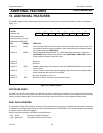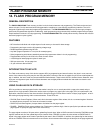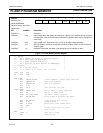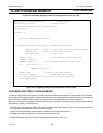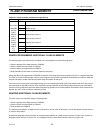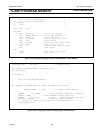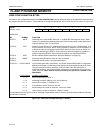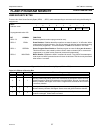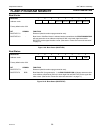
Philips Semiconductors
User’s Manual - Preliminary -
P89LPC906/907/908
FLASH PROGRAM MEMORY
2003 Dec 8 93
Table 14-1: Flash elements accesable through IAP-Lite
ERASE-PROGRAMMING ADDITIONAL FLASH ELEMENTS
The erase-program cycle takes 4ms to complete and is accomplished using the following steps:
• Write the address of the flash element to FMADRL.
• Write the CONF command (6CH) to FMCON.
• Write the data to be programmed to FMDATA.
• Read FMCON to check status. If aborted, repeat this sequence.
Writing the data to be programmed to FMDATA will start the erase-program process and place the CPU in a program-idle state.
The CPU will remain in this idle state until the erase-program cycle is either completed or terminated by an interrupt. When the
program-idle state is exited, FMCON will contain status information for the cycle.
If an interrupt occurs during an erase/programming cycle, the erase/programming cycle will be aborted and the OI flag (Opera-
tion Interrupted) in FMCON will be set. If the application permits interrupts during erasing-programming the user code should
check the OI flag (FMCON.0) after each erase-programming operation to see if the operation was aborted. If the operation was
aborted, the user’s code will need to repeat the process.
READING ADDITIONAL FLASH ELEMENTS
The read cycle is accomplished using the following steps:
• Write the address of the flash element to FMADRL.
• Write the CONF command (6CH) to FMCON.
• Read the data from FMDATA
The read cycle completes in a single machine cycle and thus will not enter an idle state. It can be interrupted. However, there is
no need to check status.
An assembly language routine to perform an erase/program operation of a flash element is shown in Figure 14-4. A similar C-
language routine is shown in Figure 14-5. A C-language routine to read a flash element is shown in Figure 14-6.
Element Address Description
UCFG1 00h User Configuration byte 1.
Boot Vector 02h Boot vector
Status Bit 03h Status bit byte
Security
byte 0
08h Security byte, sector 0
Security
byte 1
09h Security byte, sector 1
Security
byte 2
0Ah Security byte, sector 2
Security
byte3
0Bh Security byte, sector 3
Mfgr Id 10h Signature byte, manufacturer id
Id_1 11h Signature byte,id 1
Id_2 12h Signature byte,id 2





